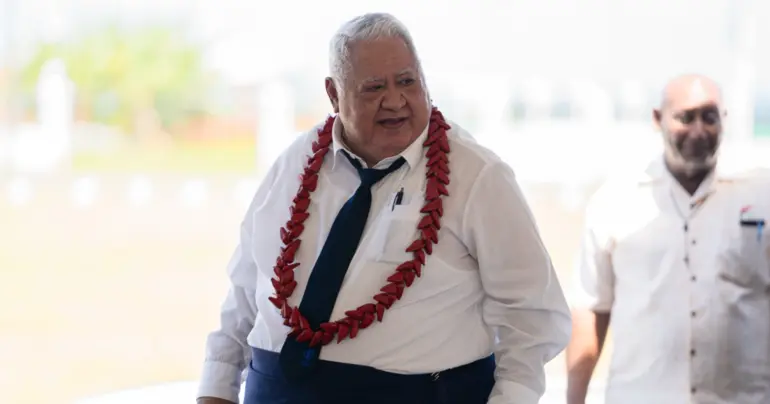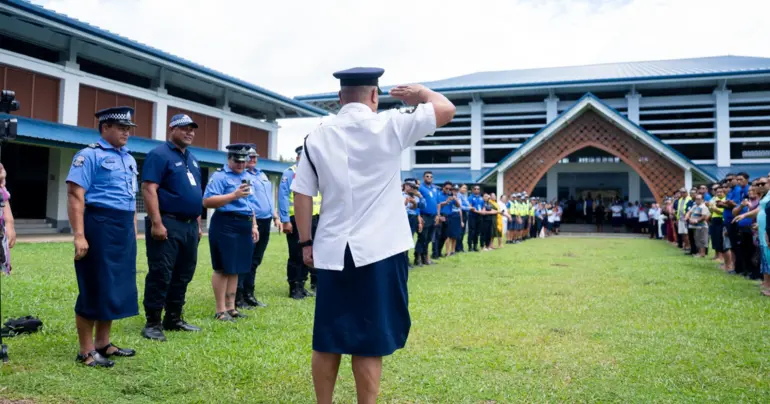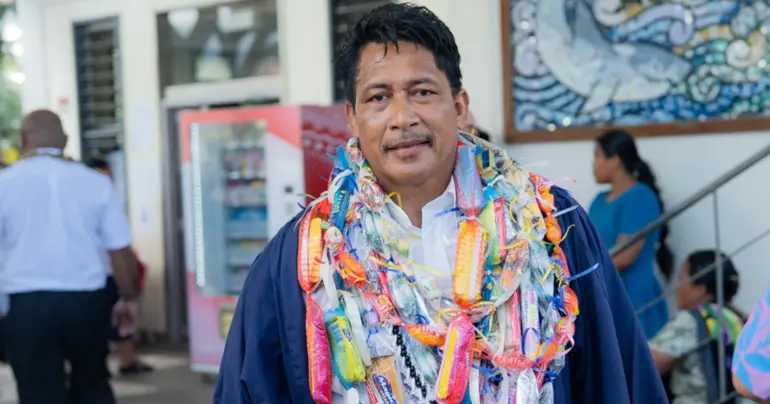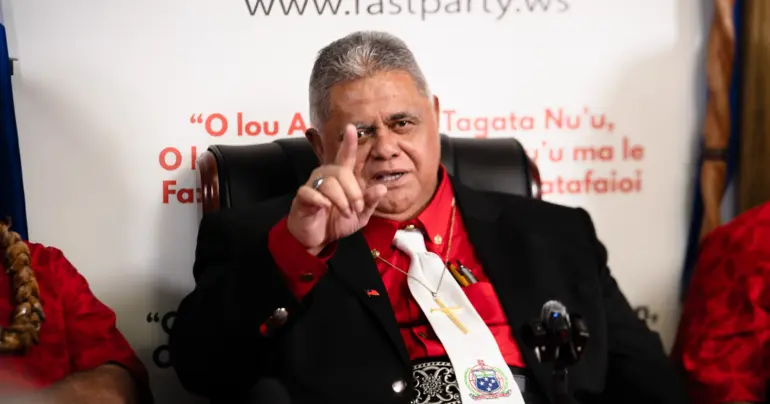Systemic gaps in Samoa led to epidemic: United Nations
 By Sapeer Mayron
•
08 December 2019, 3:00PM
By Sapeer Mayron
•
08 December 2019, 3:00PM
The United Nations has contradicted the Samoan Government’s explanation for the causes of the measles outbreak, saying that a lack of access to immunisation and public education campaigns helped create the conditions for the epidemic.
Despite what the U.N is calling an “honest assessment” of Samoa’s vulnerabilities being released to the world in a joint response appeal for nearly $30 million, Prime Minister Tuilaepa Dr. Sailele Malielegaoi is insistent that anti-vaccination lobbyists and parents are responsible.
“The vulnerabilities have been recognised by this government in this document, this document is informed by the government,” U.N Resident Coordinator Simona Marinescu said at the appeal launch on Friday.
“We reflected on what happened and we came out with a very honest assessment of where the needs are. I think it is extremely important that we rebuild trust together in the medical system,” she said.
The admission come after the government took drastic measures to quickly and efficiently vaccinate the entire population, using a door to door campaign that everyone was asked to stay home for on Thursday and Friday.
So far, 65 people have died during the epidemic, 57 of them under four years old. Prime Minister Tuilaepa has dismissed claims his government should be held responsible, that the response came too late or that he should order an inquiry into the matter.
He has denied that national systems in healthcare or education could have worked better to prevent the epidemic, saying immunisation – the only prevention against measles – has been down to the individual.
“A lot of these oversights have nothing to do with the oversights have nothing to do with the work of the health, it’s the personal choice of the mother herself,” Tuilaepa said.
He said he has himself seen several red flags, an indication someone at home is not vaccinated, outside houses just metres away from the hospital in Moto’otua.
“You can see the kind of complacency that our people have,” Tuilaepa said.
“There are parents who did not believe their children should be vaccinated… It is a question of educating our people to understand what they must do.”
But the national appeal, which is asking for millions of dollars in help to fund systematic improvements in both health and education on vaccine safety, access and awareness as well as the digitisation of health records, suggests the Prime Minister is alone in his view.
The appeal is calling for US$1.1 million (T$2.9 million) alone for communication and information technology support, to digitise vaccination records that up until how have been entirely paper based and could not accurately reflect immunisation rates, nor inform any activities to deal with the epidemic.
Ms. Marinescu said among the needs the appeal identifies is that access to immunisation needs work.
“Proper management of immunisation including access to infrastructure of immunisation has been identified as an area in which there is room for improvement, so this is part of the appeal the Government put together,” she said.
“While the system was in place, while vaccines were available and could have taken place, in some cases access was a problem, or lack of trust or lack of information to the family to understand the importance of that.”

Samoa needs to work together to rebuild trust in the medical system, not only because of the vaccine incident of Savaii last July but because of historical mistrust as well, Ms. Marinescu said.
World Health Organisation representative in Samoa Dr. Rasul Baghirov said he has yet to come across a family in the rural villages who does not want to immunise their family.
“I spent all day yesterday in the field. I didn’t see a single case where a family said no, my children will not be vaccinated, or we will not be vaccinated.
“In fact, on the contrary, I was seeing people waving at us, saying please come to this household there are people who are unvaccinated.”
He said while there are undoubtedly pockets of people against vaccinations who are advocating families to resist the measles jab for themselves or their children, they are not the majority of cases.
More damaging to Samoa’s immunisation rates is the voluntary vaccination system, which left the choice up to parents. It is a matter many countries are waking up to, Dr. Baghirov said, including Samoa which has said it will make vaccinations a prerequisite for school entry.
This, the devastating death of two babies in Savaii and the health system being swept up in its own merger matters at the same time also contributed in their own way to the low rates.
“One needs to look at the complexities,” Dr. Baghirov said.
“At this point I would rather avoid pointing the finger to a particular factor as the number one factor in this crisis.”
Dr. Nikki Turner, chair of the immunisation working group to the Strategic Advisory Group of Experts to the W.H.O. said the mandatory vaccination move cannot be the only answer to Samoa’s poor immunisation rates.
Based in Auckland, Dr. Turner has been following Samoa and other countries around the world grapple with measles, including New Zealand.
She said by and large, poverty is a major contributor to whether families vaccinate their children or not. For poor, busy, and often very large families, preventative healthcare like vaccinations are not a priority.
Like her United Nations colleagues, Dr. Turner is loath to suggest anti-vaccine attitudes cause epidemics, but are rather a symptom of larger problems.
“Every time we look at the major issues for why immunisation coverage rates are low it’s because our systems need strengthening,” she said.
“If the system doesn’t work well the community loses trust and then anti-vaccination gets in.
“We have to make our healthcare services work for our communities and that means we have to get out there and support our communities, get the services to them effectively in a way that works for the communities.”
Dr. Turner said one area that needs looking at is making the immunisation experience a positive one, both for the babies and their parents. That will ensure not only that the first lots of vaccine doses are given, but that families return for the supplementary doses that ensure full immunity.
“You can vaccinate a child without making them cry, you can vaccinate a child sitting them positively with their mother, with the little baby breastfeeding all the way through,” she described.
“Remind them when the next one is due, and when they don’t turn up have a system in place where you go and find them.
“That is what New Zealand put a lot of effort into and we used to have low coverage but by these simple approaches we rapidly improved.”
With Samoa looking to make vaccination a prerequisite to school entry, Dr. Turner cautioned against treating the rule as a “silver bullet” to the problem of low immunisation rates.
It is just one part of a healthcare system, she said.
“In my experience, in many countries people do care for their children and want to do right by them.
“They need a lot of help and health literacy support to understand the importance of vaccination and then the health services need to enable it to happen for them.”
Making vaccines mandatory, both in law and under the State of Emergency today, can be a meaningful way of putting attention on the importance of vaccinations. But people need to continue learning and engaging in the issue, Dr. Turner said.
Prime Minister Tuilaepa, answering whether he would close down Samoa again for another round of door to door vaccinations said he is cautious of “spoon feeding” his people.
He would rather families used the 999 line, opened by the National Emergency Operations Centre, to phone and order a vaccine mobile clinic to their home, which would show they know what they need to do for their families.
Dr. Turner said she agrees that people need to understand the vaccination programme.
“I absolutely understand the Prime Minister, you need to look to all the components to support the system and ask community leaders how you can galvanise communities to see the importance of an issue.”
When the measles epidemic is over, and the disease has left Samoa, the nation will be tested to maintain high coverage rates without the threat of death looming over it.
“Now that you have got measles you all get the issue, but when it goes away, how do communities understand the absence of disease?” Dr. Turner said.
“That is a really challenging issue.”
Tags
 By Sapeer Mayron
•
08 December 2019, 3:00PM
By Sapeer Mayron
•
08 December 2019, 3:00PM











